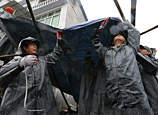
Companies from Brazil, Russia, India, China and South Africa (the BRICS) are rapidly expanding across the globe, in many cases successfully taking market share from multinationals headquartered in developed economies. As part of this process they are building subsidiaries overseas, both in emerging and developed countries. According to the UNCTAD World Investment Report, almost 25 per cent of all global Foreign Direct Investment now emanates from emerging economies, which account for six of the top-20 investing countries. As a result, a number of emerging multinationals from the BRICS now have activities that span the globe. Huawei, for example has operations in over 140 countries. The Brazilian company Vale, meanwhile, has mining operations in Bahrain, Belgium, Canada, France, Norway and the US. South Africa’s SABMiller now operates on all of the world’s six continents.
Pioneers from the BRICS have also been increasingly active in the market for cross-border mergers and acquisitions (M&A). Last year they accounted for almost 30% of global cross-border acquisitions by value.
The implications of these BRICS companies going global are profound. Going global is not only allowing pioneers from the BRICS to win a share of new markets; perhaps even more importantly, their global forays are helping them build new sources of competitive advantage and move up the value curve.
First, going global is helping the pioneering BRICS companies ramp up innovation. Many commentators based in developed countries wrongly believe that companies from the BRICS are not innovative. They make this mistake because the fail to see that profitable innovation is about much more than technological breakthroughs, R&D spending, or numbers of patents. In reality, leading companies in the BRICS have been innovating for years. But many of their innovations aren’t counted by conventional measures. They include business model innovation, “cost innovation” (novel improvements in the price/performance ratio of product offerings), and innovations in management systems and processes. These kinds of innovations by the BRICS companies have already proven powerful: Chinese firms, such as Tencent, Brazilian firms such as Gerdau and AmBev, and Indian firms such as Bharti Airtel and SKS Microfinance, have revolutionized their respective industries through this kind of innovation.
Now the pioneering BRICS companies are taking the next step. They are building on their existing base of innovation by setting up R&D laboratories overseas, forming alliances foreign research institutes and acquiring small technology companies around the world. Chinese companies are leading the way. Last year “industrial acquisitions” – mainly focused on acquiring technology and R&D capacity – accounted for 20% of the total number of deals completed by Chinese companies. And nearly two-thirds of these were mid-sized industrial companies in Europe, half of these in Germany alone. Many of the rest were smaller US companies with strong technology or design skills. Examples abound: AAC Technologies, a leading supplier of microphones used in Apple’s iPhone and Samsung’s handsets, has acquired a string of 8 small technology companies in made Denmark, Finland, Japan, Korea, Sweden, Switzerland, and the USA to gain access to the latest technologies, R&D capacity, and design skills for use in microphones, speakers and cameras used in mobile phones; Beijing Genomics Institute, acquired the US gene sequencing company Complete Genomics, giving it access to gene sequencing technology to meet its goal of bringing down the cost to $1,000 per person so it can be incorporated into mainstream medical care; earlier this year Wanxiang acquired the civilian unit of Massachusetts-based advanced battery maker, A123 Systems. Huawei, meanwhile, has built a 23-country global R&D network now includes centres in France, Germany, India, Italy, Russia, Sweden, and the United Kingdom.




















![]()
